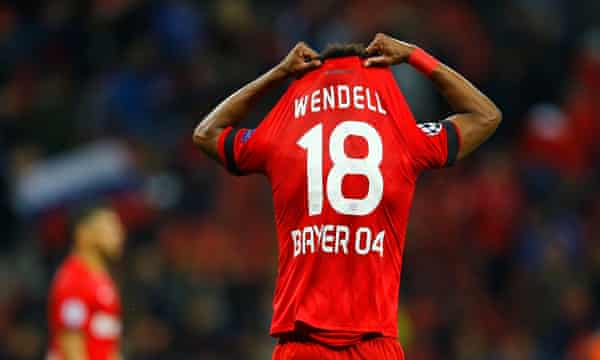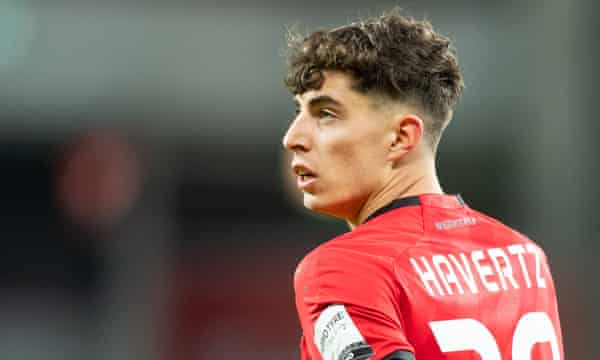Wendell: ‘Brazilian players have a higher value as we produce the best’
For some Brazilians, the road to approbation in European football is bumpy. The most obvious obstacle is the playing style – higher paced, less forgiving – and there are the additional challenges of the climate, language, food and baffling local customs. But the route Wendell followed when he moved from Rio Grande do Sul to North-Rhine Westphalia as a fresh-faced 20-year-old in June 2014 had been smoothed by years of use.
Brazil and Bayer Leverkusen have a long-running and intense love affair. Throughout the 1990s and 2000s, Seleção stalwarts Jorginho, Emerson, Zé Roberto and Juan each racked up more than 100 games for the club.Paulo Sérgio was a Bayer player when he won the World Cup in 1994, as was Lúcio when he won football’s greatest prize in 2002.
“The tradition helped a lot”, says Wendell. “The club has a bit more patience with you. Zé Roberto told me that I was in the right place to be arriving in Europe, because they give all the support possible for Brazilian players, if you need someone to sort something out with the council or if something in your house breaks and you need it fixed. It gives you tranquillity and security. You only worry about playing football.”
This season, his sixth in Germany, Wendell became the first South American to reach 200 appearances for Bayer and, though they finished a disappointing fifth in the Bundesliga, he still has two chances of doing what none of his Brazilian predecessors managed: winning a trophy at the club. In August, Bayer will play a Europa League last-16 second leg against Rangers, having won 3-1 in Glasgow. And, a little more pressingly, Bsyer face Bayern Munich in the German Cup final on Saturday afternoon.
Bayern have crushed everyone since the Bundesliga resumed in mid-May, winning 10 straight games, including a 4-2 victory over Bayer. But Wendell, who says he has been thoroughly impressed by the way German authorities have handled the return of football, is undaunted. “Bayern is the best game you can play,” he says excitedly. “It makes you run more, apply yourself more, go for it even harder. And it means that we can play the way we like, too. The best games are against the big teams because you have the possibility to attack them.”
In the 18 months since the arrival of manager Peter Bosz, attack is something they have done well. The Dutchman went to Leverkusen under something of a cloud, after a brief and unsuccessful spell at Borussia Dortmund. But Wendell says Bosz has proven himself to be a “great coach”, injecting the team with a new verve. “Before him, we played on the counter,” says Wendell. “But he likes us to play with the ball, to keep possession in every game to make the other teams run. We are an offensive team, a team that takes the game to the opposition.”
Their fans, he says, have responded well to that change in approach. But they will be forced to play without them once more on Saturday. “You feel more secure playing with your fans, it gives you more strength. Here in Germany you feel it even more because the stadiums are always full.” But he also believes that empty stadiums make games “more even”, which could favour them in the final.
That 4-2 defeat to Bayern at the start of June, he says, was instructive rather than intimidating. “What stayed with us is the difficulty that we created for ourselves. We became desperate, and let Bayern win the game in the first half. We lacked a bit of wisdom on the pitch. We need to take lessons from the first time we faced them in the Bundesliga this season, in Munich, when we won 2-1. We need to apply ourselves in the same way we did then.”
If they can learn those lessons and stay in the game longer than they managed a month ago, Bayer have a player capable of winning matches against even the best opponents. Kai Havertz’s performances this season have drawn admiring glances from Chelsea and Liverpool, and Wendell believes the 21-year-old is destined for great things. “He’s a complete player. If you play him as a No 9, as a No 10 a little bit behind, or out wide, he will know what to do. He understands what the manager wants. He finishes well with both feet. He’s strong with his head. He has good technique. Psychologically, the Germans are very focused people. They are very concentrated on what they want. If he goes to the Premier League, he will learn a lot. I think Kai dreams of playing there. He has that desire. If he decides to play in England, he will be a success.”
Wendell appears open to the possibility that he too may one day play in England. “It’s a league that everyone wants to play in, it’s so good to watch,” he says. If he does move to the Premier League, he would be part of a trend. In the 12 seasons between 1997 and 2009, no team won the Bundesliga without a Brazilian player. Now though, that knot has loosened. Wendell says that is because German clubs have started to look a little further. “Argentina already exported like Brazil, but now you have Chileans, Uruguayans, Colombians. And they cost less than if you sign a Brazilian player. Brazilian players have a higher value because we are the ‘país do futebol’, because we produce the best players.”
That widening of horizons is evident at Bayer, where Jamaican forward Leon Bailey, Chilean midfielder Charles Aránguiz and the Argentinian duo of Lucas Alário and Exequiel Palacios often line up together. But that bond with Brazil remains and the club added young forward Paulinho in 2018. Signed from Vasco da Gama, Paulinho moved to Leverkusen as soon as he turned 18 and is an example of a growing trend. “Twenty is almost the maximum [age for a Brazilian to move] now,” Wendell says. “At 25 you’re already old for Europe. More and more, the clubs are bringing players at 18. Look at Paulinho, Vinicius Jr. Rodrygo. It might be because there will be greater competition [to sign them] in the future.
“Paulinho has been working really well during the two years he’s been here. But it’s better for people to come with more experience. Sometimes it will not go well and the player will end up going back. A lot of the time it’s not the player’s fault, it’s because they got there too young.”
Despite that risk, he says, European clubs will always turn to South American players, not only for their technical skill, but for a psychological attribute that is sometimes overlooked. “We always want to win,” he says emphatically. “We never accept a draw or a defeat. All South Americans are like that. We always want to be the champion.” Wendell has a chance to show the world what he means against Bayern on Saturday
Follow us on twitter (ajuede.com) or on Instagram (ajuedeman) for details of the global situation presently.








.jpeg)
Comments
Post a Comment